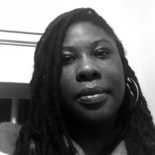SCHOLARS PROGRAM ’98 | THE LAWRENCEVILLE SCHOOL ‘ 02 | BROWN UNIVERSITY ’06 | UNIVERSITY OF CALIFORNIA – BERKELEY ’14
Before SEEDS entered my life, I was a high-achieving student fortunate enough to have had involved, competent, and resourceful teachers who worked within an underfunded school system in a minoritized city labeled one of the worst cities in America by numerous rankings. The language at the time was that I had to “get out” to realize my academic potential. It was at this point that an amazing and dedicated guidance counselor by the name of Robin Wise recommended that I apply to SEEDS.
Applying to and participating in SEEDS was an important step, not just for me, but also for my family. We had immigrated to the US, settled in Camden, and did not have a lot of economic resources at the time. So, while I had dreams about attending college, how that would happen was still hazy. In my case, I remember feeling and being told by my teachers that I was outstripping the curriculum and that I needed to be challenged in a way that was not available to students, especially Black students from Camden NJ.
Being a part of SEEDS, not only was I challenged, but I was also supported. I was given the resources and guidance that I had been yearning for, and my dreams seemed more in reach. Although SEEDS opened doors to opportunity, it also opened my eyes to the fact that an unfair educational system is a hurdle.
At the time, attending a private, independent school wasn’t even on my radar. As I continued through the SEEDS program, I knew that what I wanted was to learn more and realized that these schools could offer that and more. And while my end goal wasn’t necessarily going to private school more than just wanting better education, I remember thinking that The Lawrenceville School, where I was eventually placed into, was gorgeous in a way that I didn’t know high schools could be.
Lawrenceville was immensely wealthy and privileged in a way that I did not even fully understand at the time. In a way, it prepared me for the privilege I experienced in the Ivy League, at Oxford, and in other elite spaces. I mean that both positively, meaning that I put loss stock in the illusions of privilege now than I otherwise would, and negatively, in the sense that I had to contend with the worries of impostor syndrome and not belonging a little earlier and so the crises that these processes of exclusion generate became familiar to me. The educators were JUST as dedicated though—no more and no less than the ones I had in Camden.
Had it not been for SEEDS, I doubt I would have taken the exact life path that I did end up on. I am also quite certain that I would most likely still be in New Jersey instead of having had experience living in different countries. Without SEEDS, I would have been less aware of the possibilities, however, I believe I would have only faced a different set of challenges rather than be rid of or mired in them. There is no escape from racism or sexism in the United States.
For anyone looking to be a part of SEEDS, I would say to trust the process, foster the connections, and blossom as your whole self no matter what anyone or any institution says.
